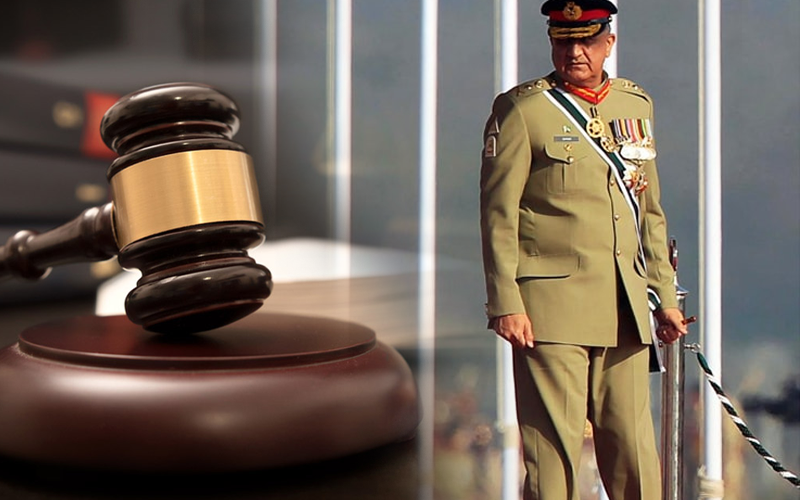Extension of the Army Chief’s Tenure

The Supreme Court of Pakistan in Jurists Foundation versus Federal Government (Constitution Petition No. 39 of 2019) dealt with the issue of the tenure and extension of the Chief of the Army Staff (the ‘‘COAS’’).
The Attorney-General defended the Federal Government by submitting that the extension of the COAS is within the constitutional and legal fold. He submitted that the tenure of the COAS is three years as per unwritten convention and practice; that the tenure of the COAS can be extended under regulation 255 of the Army Regulations (the ‘‘Regulations’’); that the said regulations have been framed under section 176-A of the Pakistan Army Act, 1952 and, therefore, have statutory force under Article 243(4) of the Constitution.
The SC observed that is our government of laws or of men? The case before us questions whether the COAS has a tenure or can seek an extension or has any terms of service under the law. That the Pakistan Army Act, 1952 (the ‘‘Act’’) and the Pakistan Army Act Rules, 1954 (the “Rules”) are totally silent about the tenure or age of retirement of a General. Section 18 of the Act states that the prescribed authority may, in conformity with such rules as may be prescribed in this behalf, retire, release, or discharge from the service any person subject to this Act. While Rule 12 of the Rules provides that the retirement or release of an officer shall be authorised by the Federal Government and notified in the official Gazette.
Finally, the SC concluded that: 1) That the Act, falls deficient of the structural requirements for raising and maintaining an Army under clause (3) of Article 243 of the Constitution. It does not provide for essential elements required to raise and maintain an Army, particularly the grant of Commissions in the Army and the terms of service of the Commissioned Officers including tenure and extension of a General. 2). That there is no provision in the law for extending service of a General for another tenure; nor is there any consistent and continuous institutional practice of granting such extension, which could be enforced in absence of the law on the subject. 3). That regulation 255 of the Regulations in its original as well as amended form, does not confer authority on the Federal Government to grant extension of another full tenure to a General. This regulation provides for only a temporary arrangement for a short term, if the exigencies of service so requires in the public interest. 4) That in view of the legal vacuum regarding tenure and extension of a General and the assurance given by the Attorney-General to process legislation on the subject within six months, and also considering the importance of the responsibilities of the COAS it is appropriate to leave the matter, at the first instance, to be decided by the chosen representative of the people of Pakistan by making an appropriate legislation; and the incumbent COAS may continue for a period of six months, in order to preserve continuity of the institution.
The argument of the SC appears weak. Main question raises here why the framers of the Constitutions 1956, 1962, 1972 and 1973 did not regulate the tenure/extension of the COAS. It is argued that as the COAS holds its office till the pleasure of the executive (President) like the appointment of Attorney General and the Governors, so the framers of the Constitutions kept the same open intentionally. It is the executive’s discretion to appoint, extend the term or remove any COAS at any time.
Second, how the SC can extend the tenure of the COAS which is purely an executive function. It means that if the executive desires to remove the COAS it cannot do so because the court has extended the tenure of COAS for six months, thus, the court has violated the doctrine of separation of powers by interfering into the functions of the executive. The concept of trichotomy of powers between the legislature, the executive and the Judicature, is a fundamental principle of our constitutional construct. Under the Constitution, these three organs of the State have been entrusted with separate and specified functions. The primary function of the legislature is to legislate laws, the executive to execute laws, and of the judicature to interpret the laws. The Chief Justice Marshall of the US Supreme Court said: “the Legislature makes, the Executive executes, and the Judiciary construes, the law.”
Third, the SC cannot direct the Parliament to make any specific law. The view of the court that it can direct the Federal government under Article 203-D of the Constitution to make the law and give specific time in this regard seems misconception by the court. Under Article 203-D of the Constitution, only the Federal Shariat Court (not the SC) can direct the Federal government to initiate the process of law if some law is against the injunctions of Islam. It is argued that it is the domain of the legislature to make any specific law or not. It was more appropriate if the SC make full bench and appoint amicus curie to discuss this important matter in depth.
Request a Free Quote
Please enter your information below to receive a prompt response from one of our experts.
WhatsApp us

